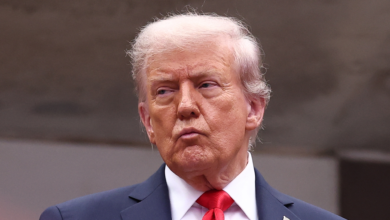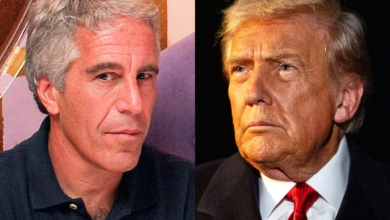Soldiers Are Taking a Stand Against Trump’s Abuses
On the Fourth of July, members of the military are calling on Congress to protect service members who disobey the president’s immoral or unlawful orders.

Kim, an aircraft mechanic, joined the Army in 2019 at age 18. She and her mother were struggling to survive, sometimes even living out of their car. Thinking she couldn’t afford college, she didn’t apply. Like many young Americans in her situation, Kim joined “for a steady paycheck, a roof over her head, and something to eat at the end of the day.” After a single tour of duty, Kim spent most of her time on base, but she enjoyed the routine: getting up early for 15-hour workdays, staying up late to earn her associate’s degree, making lifelong friends, and meeting “amazing mentors.” But in 2024, she began to worry about what the new administration might demand of the Army.
As Kim Read “Project 2025,” the Heritage Foundation’s blueprint for Trump’s far-right authoritarian government, Kim grew increasingly concerned about the possibility of unlawful orders, including the president’s use of the military against American civilians. Although she had planned to remain in the Air Force for 20 years, she decided to leave the service. Today, she is no longer on active duty, but since she hasn’t served the full eight years, she could be redeployed. Kim isn’t her real name; she spoke to TNR on the condition of anonymity so as not to jeopardize her future. A dishonorable discharge could jeopardize her job prospects and jeopardize her hard-earned military benefits. “I did a good job,” she told me.
She was right to worry about Trump’s misuse of the military. Last month, Marines were deployed against peaceful protesters in Los Angeles. “And now we have the military on our streets, and that’s not where we’re supposed to see them,” Kim said. She still fears she’ll be asked to participate in that.
She’s speaking out as part of a campaign launched by Abbott Face, a veterans organization, which is launching a “Right to Refuse” campaign today, July 4, arguing that service members deserve the right to refuse illegal or immoral orders, in the hopes that Congress will pass legislation strengthening protections for service members who do so. Founded by Iraq War veterans concerned about the immorality of that conflict, Abbott Face has in recent years received objections from military personnel about sending weapons to Israel, the dismantling of diversity, equity, and inclusion within the military, and, more recently, the risk that they will be pawns in Trump’s authoritarian fantasy, whether in the crackdown in Los Angeles or the military parade in Washington,D.C.
Brittany Ramos DeBarros, About Face’s organizing director, is an Afghanistan veteran who was court-martialed for opposing that war during her service. She acknowledges that Congress won’t pass this bill quickly enough to resolve the current constitutional crises—if it ever does—but she sees it as a rallying point for the military community. She says families and service members need support moving forward, and many are mobilizing and organizing. From experience, she acknowledges that the military can be irritating if you don’t agree with it.
“I find it profound that people automatically move past that point to start talking to each other: ‘I’m really concerned about this. What are you going to do?'” » DeBarros says many are asking themselves what is in their best interest, but also what the more ethical choice is: Is it better to resign publicly, or “is it better to have more service members, when the time comes, ready to step up and do what’s right? It’s a complex question that people are grappling with.” On the one hand, service members risk losing benefits and going to jail if they refuse to comply; but if they don’t refuse unlawful orders, she added, many “will live with the emotional harm and consequences of having done something they know is wrong.” “The deployment of the federal National Guard and Marines to Los Angeles is unprecedented and violates constitutional norms,”
said Laura Dickinson, a law professor at George Washington University who is an expert on the military, national security, and the law of armed conflict. “Traditionally, the U.S. federal government has been very cautious about using the federal military on home soil for law enforcement purposes. This is a violation of norms and a source of deep concern for the military.” Dickinson emphasized that deploying the military against Americans could seriously undermine that trust, adding, “We’re seeing concerns within the military right now about this.”
Dickinson emphasized that the deployment of Marines and the federal National Guard in Los Angeles—and they remain there—is not “clearly illegal,” as the state of California has filed a lawsuit over it. DeBarros also noted that “there is no clear consensus among legal scholars on what technically constitutes a lawful order and what constitutes an unlawful order.” But even if a military member is faced with a clearly unconstitutional order, the appropriate course of action is unclear. Challenging the U.S. military is one of the most daunting prospects. Disobedient soldiers can be court-martialed and face imprisonment. However, if they are carrying out illegal orders, the fact that they were merely “complying with orders” is no defense in a criminal trial. All of this puts the military in an untenable position.
Another fear is that Trump will invoke the Insurrection Act—which authorizes the president to deploy the military in the event of unrest “against the authority of the United States”—simply to suppress protests. DeBarros points out that the Marines are not trained in law enforcement: “The military, in particular, understands that perhaps no branch of the federal government is less well-equipped to conduct de-escalation efforts than the Marines,” who are trained for war, where the rules of engagement vary considerably. During his first term, Trump contemplated shooting protesters in the legs—a clear example, as Dickinson points out, of what the police are not allowed to do.
“I may not have joined the military out of pure patriotism,” said Kim, a member of the Air Force, “but I nevertheless raised my right hand and took an oath to defend the Constitution against all enemies, foreign and domestic. But the American people are not the enemy of the Constitution at home.”







